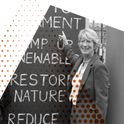As the climate crisis reaches a new and dangerous phase, world leaders are in full preparation for next month’s United Nations climate summit.
At the global level, we are watching the aftermath of hurricanes in the Americas. Back home, families in Britain continue to face shockingly high energy bills, owing to our reliance on volatile fossil fuels. The latest annual State of the Climate report, published this month, indicates that 25 of Earth’s 35 “vital signs”—including increased CO2 levels and heat in the oceans—are worse than ever before. There has never been a more important time to act.
The new government is taking these threats seriously, and has adopted real domestic ambition, which is the foundation of global climate leadership. But if we are to tackle the climate crisis, we need to actively promote international agreement and action.
In an increasingly unstable world, getting leaders to agree to collective endeavour is a difficult task. But the UK has distinct advantages that can enable us to show the way. The government has adopted a more committed approach to tackling our own emissions than any other major economy. This gives us legitimacy in dealing with countries in both the Global North and the Global South. We can show the former that climate action can drive economic growth, while supporting the latter to develop without risking environmental degradation.
Labour’s approach to this new internationalism has been described as “progressive realism”. The new foreign secretary, David Lammy, has made clear that this means being honest about the state of the modern world and the UK’s place within it. But he and the new government have also made it clear that this pragmatism will be in service of, and not in opposition to, the delivery of just goals, including tackling climate change.
Just as climate change impacts us at home, it exposes all countries to new existential threats. We must be proactive in dealing with international partners, and harness the legitimacy of our own actions to push for greater global climate ambition. There are vital decisions that need to be taken at this COP. The architecture of the world’s financial system must be updated so that developing countries can build up industry in a sustainable manner and experience the same advantages from which the Global North has benefitted for so long. We also need an international consensus that the era of fossil fuels is coming to an end and clear agreements to phase out their use.
The UK can lead the push for these ambitions because we have a history of being at the forefront of efforts to tackle climate change. In the 20th century, British scientists were among the first to identify that CO2 levels in the atmosphere were increasing and causing global warming. In 2008, we were the first country in the world to introduce legislation to reduce emissions, in line with the Kyoto Protocol. And at the end of last month, we became the first country in the G20 to remove coal from our electricity system.
This last achievement, ending 142 years of coal-fired electricity in the UK, was the culmination of 15 years of work by policymakers, unions and industry. In 2009, when the decision to end the use of unabated coal was made, it was widely believed to be unfeasible. But by taking bold, early action, the UK has been able to show partners around the world that coal-free power can be achieved without a catastrophic impact to economic growth or energy security.
This progress has helped us push for greater climate ambition internationally. Last year’s COP28 conference saw parties agree to “accelerate efforts towards the phase-down” of coal use. This year, we should be pushing for the world to go further, using our example as proof that we can end the use of coal and stop the construction of new coal-fired power stations.
That Ed Miliband, the secretary of state for energy security and net zero, will be the UK’s chief negotiator at COP29 demonstrates how seriously the government is taking negotiations. This will give the UK diplomatic weight to reach a more ambitious deal. The new, UK-led Global Clean Power Alliance, announced by the foreign secretary, is also aimed at accelerating the worldwide shift to renewable energy.
Admittedly, not every country is as bold on climate as we are, and progressive realism means accepting the world as it is. However, it also means striving for change and using our example to push the international community further.
Fulfilling our mission of 100 per cent clean power by 2030 would make the UK the first major economy to remove fossil fuels from its electricity system. It would show that there is a path to growth beyond burning more carbon. Likewise, fulfilling Labour’s manifesto commitment to end new licences for fossil fuel extraction would make the UK among the first countries committing to a world beyond coal, oil and gas.
In recent years, the phrase “world-leading” has been used as filibuster in place of actual policy or real action. But achieving change, both at COP29 and beyond, would make this phrase tangible. We have shown the world that climate change can be legislated for, and that coal can be “switched off” without imperilling economic security. As we prepare for the next round of climate talks, the UK will go further, highlighting the zeal of our clean energy mission and taking our place at the forefront of ending fossil fuel extraction.
Climate change is the greatest danger we face. I’m confident that the UK, under a new government, will demonstrate global leadership by harnessing our own climate ambition to show the world that we can overcome this challenge together.













